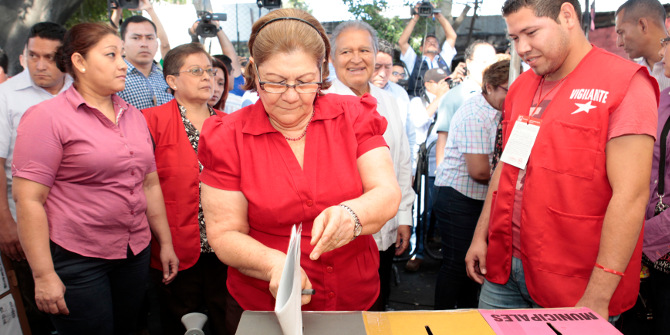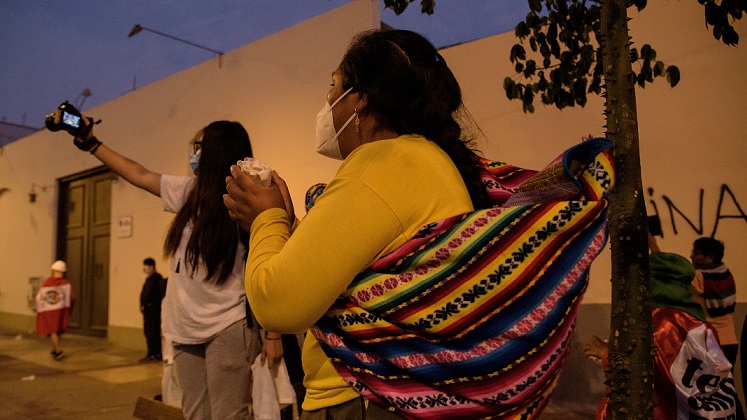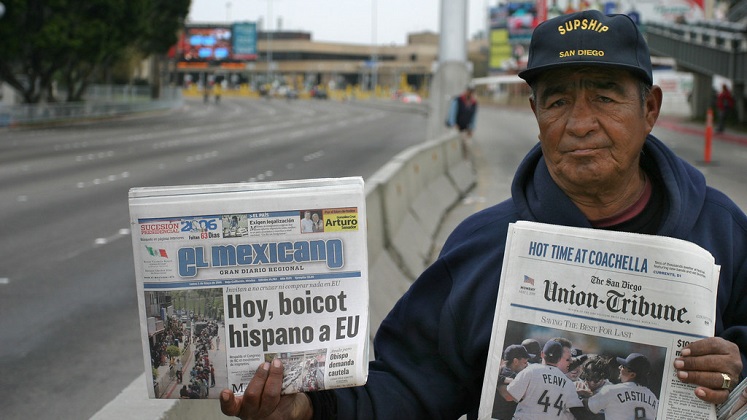 El Salvador’s legislative and municipal elections on Sunday, 4 March, 2018, kick off an election cycle that will stretch through to next year’s presidential ballot. A desperate security situation, threats to Salvadoran migrants in the US, and a growing generation gap in traditional parties could mean a bumpy ride for the country’s politics, writes Adrian Bergmann (Central American University).
El Salvador’s legislative and municipal elections on Sunday, 4 March, 2018, kick off an election cycle that will stretch through to next year’s presidential ballot. A desperate security situation, threats to Salvadoran migrants in the US, and a growing generation gap in traditional parties could mean a bumpy ride for the country’s politics, writes Adrian Bergmann (Central American University).
Since the end of the civil war in 1992, Salvadoran party politics has been dominated by the National Republican Alliance (ARENA), on the right, and the Farabundo Martí National Liberation Front (FMLN), on the left. ARENA held the presidency from 1989 to 2009, when the FMLN managed to eke out a win. While no single party has achieved a majority in the legislative assembly since 1991, ARENA has dominated in municipal elections throughout the postwar era. On 4 March, these basic trends will continue.

That said, recent legislative and presidential elections have been extremely tight. In 2014, the FMLN’s Salvador Sánchez Cerén took the presidency with a margin of just 6,364 votes, out of nearly three million ballots cast. As the margins get tighter, the battle for votes grows ever fiercer, fueling already rampant polarisation.
The politics of El Salvador’s permanent security crisis
As I know from my own research, in El Salvador security policy has shaped elections, and elections have shaped security policy, at least since 1999.
These elections are no exception, playing out against the backdrop of an intense and protracted security crisis. In 2015, an astonishing one in every thousand Salvadorans was murdered, which represents the highest per-capita homicide rate in the world.
But there has recently been another alarming development, with a staggering rise in homicides committed by state security forces: from 11 in 2010 to 618 in 2016. This is just the latest sign of a deadly spiral of armed confrontation involving gangs, the police, and the military which erupted when a state-sponsored truce broke down in 2013.
In February 2018, just a month before the coming elections, the UN Special Rapporteur on Extrajudicial, Summary, or Arbitrary Executions, Agnès Callamard, denounced “a pattern of behaviour amongst security personnel, amounting to extrajudicial executions and excessive use of force, which is fed by very weak institutional responses”. Yet this crude, mano dura (firm hand) approach enjoys broad political support in El Salvador.
Salvadoran politicians routinely and vehemently criticise one another over insecurity, but there is little substantive difference in their parties’ approaches to the issue.
One case in point is a recent package of draconian measures decried by the UN High Commissioner for Human Rights, Zeid Ra’ad Al Hussein, for having “placed thousands of people in prolonged and isolated detention under truly inhumane conditions”. Despite this high-level criticism, the government asked the Assembly to extend the measures for another year, and legislators from all parties eagerly complied.
Rather than risk carving out new directions for security policy, in a tight contest for votes both parties stick to an extreme but popular approach that has been failing disastrously for over fifteen years.

The uncertain future of migrants from a ‘shithole country’
Alongside security policy, concerns over migration will play a greater role in 2018 than in any previous election, with Donald Trump’s presidency casting into doubt the fate of hundreds of thousands of Salvadorans in the US.
The US’ decision to end “temporary protected status” (TPS) for some 192,000 Salvadorans means that most of them — those unable to obtain another legal status in the US — will face deportation come mid-2019. This threatens to break up tens of thousands of families, separating 192,000 adults from 200,000 children who are US-born citizens, as well as fomenting social upheaval and economic stress in El Salvador.
State institutions are already scrambling to cope with the steady stream of returning citizens, but they will be stretched beyond breaking point if current TPS holders are deported on a large scale.
The announcement that TPS would end made a huge splash in El Salvador, with opposition politicians seeking to blame the FMLN government for the decision. Ironically, this was counteracted by Trump’s denigration of El Salvador as a “shithole country” just a few days later, which brought the entire political spectrum together in railing against his remarks.
The erosion of El Salvador’s two-party system
A curiosity of the Salvadoran system is that presidential elections are held every five years and legislative elections every three years, meaning that a government’s foothold in the legislature shifts once or even twice during its time in power.
Thus, this year’s elections may impact on President Sánchez Cerén’s ability to push through legislation during his final year in office, particularly as he depends on the third largest party in the legislative assembly, the Grand Alliance for National Unity (GANA), for support. Any shifts that do occur are unlikely to be drastic, however.
The longer term is a different story, as it seems that the era of bipartisan ARENA-FMLN dominance is coming to an end, with each widely seen to be in decline. The 2018 and 2019 elections could signal the beginning of their end.
As the legitimacy of ARENA and the FMLN has waned, so too the legitimacy of the political system that they have managed since its reconstitution following the 1992 peace accords. In a recent survey 75 percent of respondents reported having “little or no” confidence in the present election process, whereas 62 percent said the elections express “little or nothing” about the will of the people.

It doesn’t help that the key figures in both parties are largely the same faces that were around nearly forty years ago, and generational rifts in both parties are becoming ever more difficult to contain.
Within the past year, the FMLN has expelled Nayib Bukele, mayor of San Salvador, whereas ARENA legislator Johnny Wright declined his party’s nomination for reelection. Bukele and Wright are both in their thirties, enjoy strong public approval, and speak out against the stagnation and corruption within the parties from which they emerged.
While Bukele and Wright are blocked from running this year, they will be eligible for the 2019 presidential elections. Bukele is certain to run, whereas Wright might hold off until 2024. Whatever their individual futures, they both clearly signal a renewed effort to forge viable electoral alternatives to those currently on offer.
Ultimately, it may be this next generation that attempts once more to tackle issues of security and migration that will dominate El Salvador’s politics for the foreseeable future.
Notes:
• The views expressed here are of the authors rather than the Centre or the LSE
• Please read our Comments Policy before commenting






I am interested in your tack on the next President of El Salvador 2019?